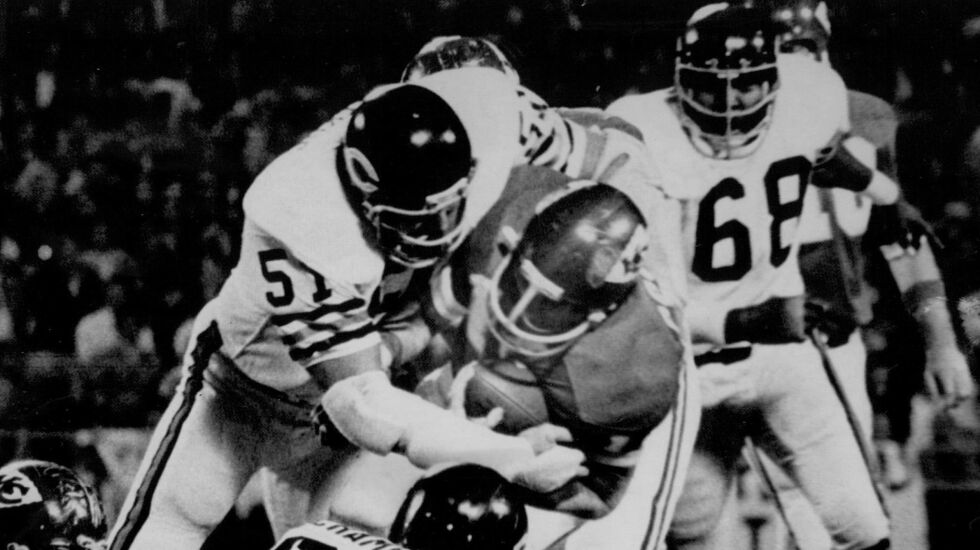
The best story about Dick Butkus, the one that summed up the fight in him and the flight response in others, had to do with the poor slobs who made the unfortunate mistake of harassing the football star’s girlfriend one day at Chicago Vocational High School.
Butkus was in full pads for practice when he noticed four guys giving Helen Essenberg, his future wife, a hard time. What happened next was recounted in a 1993 Sports Illustrated story by Rick Telander, now a Sun-Times columnist:
“Without hesitation, Butkus ran off the field, chased the car onto 87th Street, dived through the open front window on the passenger side and, in full uniform, thrashed each of the passengers. Then he climbed out of the car and walked back to the field.”
Butkus wasn’t just Chicago tough. He was tougher than Chicago. Tougher than anybody who made the mistake of challenging him. Tougher than a moving car.
The Bears legend died Thursday at 80. It was an upset. You figured he’d stare at death, and death would do what everybody else did when confronted with the menace in his eyes: run. Whatever you’ve heard about his ferocity, about his love of contact, about his need to hit someone or something, it’s probably an understatement.
As a linebacker at CVS, he accounted for 70% of his team’s tackles. There are stories about him practicing his tackling technique by running into trees. This is Paul Bunyan stuff. Also true stuff.
Butkus was beloved in Chicago not just because he was a great football player, but because he was a great football player from Chicago. Almost everybody who became a sports superstar in town came from somewhere else. Mike Ditka from Aliquippa, Penn. Michael Jordan from Wilmington, N.C. Ernie Banks from Dallas.
Butkus grew up in the Roseland neighborhood on the South Side, starred at the University of Illinois and had a Hall of Fame career with the Bears from 1965 to 1973. He was us.
And, good Lord, that name. Dick Butkus. Those hard consonants spoke of the immigrants who had come to town over the decades. Those consonants spoke of hard people working hard jobs.
He was the youngest of eight children. He weighed a ridiculous 13 pounds at birth, which meant that his mother was the first to experience what he tried to inflict on others the rest of his life.
He never won a championship with the Bears, but he was so good, so fast and so mean that it didn’t matter. He was a one-man wrecking ball playing a team sport. If the team was mediocre, which the Bears often were in his time, you amused yourself by watching Butkus try to maim the quarterback.
And, make no mistake, that’s what the middle linebacker was trying to do. Chicago loved him for it, gambling that a bear wouldn’t eat its own.
He was the best linebacker in NFL history. Lawrence Taylor fans might argue with that. So might Ray Lewis fans. They’d be arguing wrong. Butkus had it all. He was a 6-foot-3, 245-pound middle linebacker who could run. He had a total of 22 interceptions in nine seasons, the same number that Brian Urlacher had in 13 seasons with the team decades later.
Butkus’ career was cut short by injuries. When the Bears refused to pay him after he retired because of a knee injury, he sued the team. The Bears eventually agreed to pay him the remaining four years of his five-year contract, but a freeze set in between him and owner George Halas. It took five years before there was enough of a thaw for the two men to speak again. It took much, much longer for the city to feel like he was fully back in the fold.
That distance, that remoteness might seem strange now, especially when it came to someone who was so idolized in Chicago, but it made some sense. You don’t make your living being a “maniac,’’ as Hall of Famer Deacon Jones once called Butkus, and then return to polite society pretending there aren’t blood stains on your pants. It was only in the last few years that he let his personality come through on social media. Turns out that in addition to being a bloodthirsty tackler, he was pretty funny. Who knew?
I used the word “beloved’’ earlier to describe how Chicago felt about Butkus. I’m not sure he would have approved of that. Too mushy. Too touchy-feely.
Whenever a playground football game broke out in a Chicago playground in the 1960s and 1970s, the biggest, toughest kid got to pretend to be Butkus. No. 51 would have approved of that.







